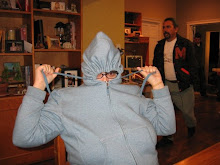 I finished The San Joaquin Siren by Bill Behrns on Tuesday night. I'd started reading it on...Sunday? It was a quick read, is what I'm trying to say. It is a memoir by William Behrns, who was a pilot in WWII, flying in the China, Burma, India (CBI) theater. I don't think I ever really paid much attention to the fact that troops were stationed in that area of the world during World War II.
I finished The San Joaquin Siren by Bill Behrns on Tuesday night. I'd started reading it on...Sunday? It was a quick read, is what I'm trying to say. It is a memoir by William Behrns, who was a pilot in WWII, flying in the China, Burma, India (CBI) theater. I don't think I ever really paid much attention to the fact that troops were stationed in that area of the world during World War II.Behrns takes the reader briefly through his early childhood to his decision to become a pilot. He describes how he got there, and then how he started flying in the Army Air Corps. He takes us through his training and finally his time in the CBI theater during WWII.
I don't read much non-fiction, but I do try to work some in every now and again. This book was a Kindle e-book I won from LibraryThing's Early Reviewers program, and I was glad of the chance to read some more non-fiction. While the subject matter was interesting, however, I found the book only okay. Mr. Behrns co-wrote the book with Kenneth Moore, but even the assistance of a more skilled writer couldn't disguise the often diary-entry, rote recitation of facts that made the book less than engaging at times. Behrns basically took us day to day through his time in the CBI theater, by listing a date, then telling us what happened on that date, including names of those involved and facts regarding the mission. I was lost sometimes by the extensive use of military and aeronautical jargon. I know next to nothing about planes or the Army, so sometimes a little explanation of terms or abbreviations would have been nice.
Overall, I'd give it two out of five Whatevers. Maybe those with a military or aeronautical background might enjoy the book more. I think it could have benefited from better editing or a more nuanced writer. Recommended for airplane buffs and those who have a strong interest in WWII.
2014-2




